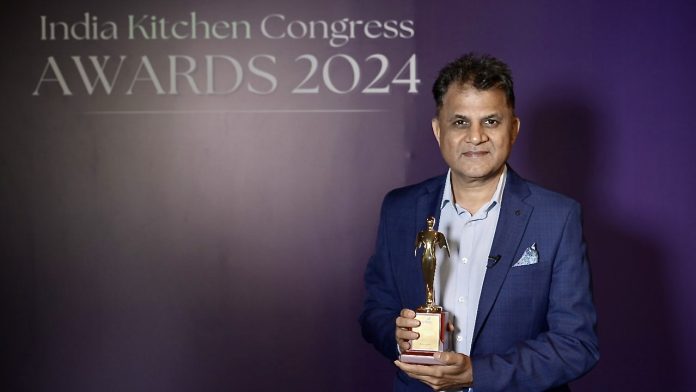Here is a furniture entrepreneur’s journey decoded by Kirit Joshi, the man who pioneered flatpack furniture manufacturing in India in 1996, built Spacewood into a nearly Rs 650-crore furniture enterprise, and brought designer modular kitchens and wardrobes to the masses through a network of around 40 branded outlets.
In this intense conversation, Kirit shows the way to founders who wish to venture into the furniture sector. He speaks of the challenges and opportunities, and what goes into building a successful enterprise. For his never-say-die spirit, Kirit is considered a flagbearer of the industry and a mentor.
In April this year, Kirit Joshi was recognised as Person of the Year at India Kitchen Congress Awards 2024.
KIRIT JOSHI is a start-up founder from another era. “I’ve been an entrepreneur from the time when the goal was to be profitable from day one, unlike today when it is valuation,” he quips, as he recalls selling answer books in college along with his classmate Vivek Deshpande, with whom he later co-founded Spacewood Furnishers.
In this 40-min interaction, Kirit speaks passionately about several things that furniture entrepreneurs in India must know, such as the founders’ conduct, building the organisation and culture, and putting together a management team.
But more importantly, Kirit explains the importance of having a growth mindset and how the lack thereof is holding back the industry. “Founders often reach a plateau within a decade or so and then they are forced to think how they can jump to the next level of growth. That is probably why, collectively as an industry, we are smaller than any of the larger furniture companies in neighbouring countries like Japan, Thailand and China. I believe it is the lack of animal spirit that limits us more than anything else.”
Chronicling Spacewood’s journey since 1996, Kirit cites the challenges that any entrepreneur would typically face. Inability to sustain high growth, being blind-sighted about governance issues, lack of management bandwidth for cashing in on new opportunities, and external risks (like a colossal fire at Spacewood) are, in his view, pitfalls that founders should watch out for.
And most specifically for furniture, which he asserts is a design-driven industry, he cautions, “If you remain value-centric, in the long run, you will be overtaken by the likes of IKEA. Design is the only way in which we can differentiate ourselves.”
Kirit also talks about the entrepreneur’s biggest challenge – giving up control to professionals. Sharing his own example, he says that this is a necessity for growth but must be done carefully. “At Spacewood we have a core team of 10-12 leaders, who’ve been with us for over a decade. We as founders mentored them to take on greater responsibilities and gave them the space to make errors and hone their judgement. However, we preferred to handhold them rather than hand over to them.”
There are a few fault lines within the furniture industry, according to Kirit, that are impediments to growth. One is the absence of a true and common narrative. “In modular furniture, the most suited raw material is particle board. Yet each manufacturer tries to convince the customer about a different material such as plywood or MDF. We do not speak the same language as an industry, and we tell different things to our customers and often misguide them. How can we achieve scale and customer satisfaction if we go on like this!”
The other is the fact that there are no entry barriers in this industry, and the reason is manufacturers are not investing enough in human capital. “We should be nurturing talent in-house. With design thinking, we will be able to inculcate design into all aspects of our operations. For that, we must develop designers. Skill development should be a perpetual activity to de-risk the operations, and for that, we should develop trainers.
For a person who has faced several trials and tribulations during a three-decade entrepreneurial journey, Kirit remains a compulsive optimist. “It’s good to see that the industry is attracting fresh investment. Stanley achieved the industry’s first IPO and that’s a good sign. Wakefit has received major private equity investment. Spacewood drew the industry’s first FDI when we set up Sumai Doors. I think the tidings are favourable and we should see many more furniture brands emerging in the coming days.”
Furniture Entrepreneur’s Journey Decoded by Kirit Joshi is a must-watch for entrepreneurs, particularly for those who are viewing the furniture industry as a career option.


